Death is no more so long as we exist: How the doctors of Ukraine's Special Forces cheat death
An anaesthesiologist pushes a patient along on a gurney. "Is he still alive?" asks a surgeon. "Not yet!" replies the anaesthesiologist.
Advertisement:The doctor, who goes by the alias Narkoz (Ukrainian for anaesthesia), reads the room, wondering if his joke went over the heads of an audience unfamiliar with medical humour.
Hidden behind a balaclava, his smile is as elusive as mobile phone signals now are, after recent cyberattacks against national telecom operator Kyivstar caused widespread service disruptions. This mask has long been his constant companion in the operating theatres and ICUs of military and civilian hospitals alike, as well as on the front lines. Narkoz began practising battlefield medicine in the early 2000s, when he was deployed to Libya under contract.
Following the 2014 occupation of Crimea, he again served as a military doctor during Ukraine's campaign against Russia-backed insurgents. A new countdown commenced at the end of February 2022 when Narkoz, an anaesthesiologist at the SSU's (Security Service of Ukraine) Special Operations Centre A, emerged wearing his balaclava. He now serves in a combat medical unit modelled after those of the world's leading armies - the US, France and Germany.
In only half an hour, Narkoz and his team can turn the inside of any building, basement or even vehicle into an operating theatre as close as they can get to the contact line. They stop the bleeding when soldiers' internal organs are torn by shrapnel, and perform open-heart surgery mere kilometres from ground zero (the line of direct contact between the warring parties). Their backpacks, weighing 25 to 30 kilograms each, hold tools and other devices that would be the envy of the surgical departments and ICUs in most brick-and-mortar Ukrainian hospitals.
"Angels" is the word the doctors' brothers-in-arms from Special Operations Centre A use to describe them. The doctors save not only the commandos' lives, but also those of soldiers from other Defence Force units. Speaking to Ukrainska Pravda, Narkoz recounted the start of his military medical career in Libya, explained why a civilian doctor has to change his mindset going into the army, how a method known as "practising on shadows" is used to train new recruits, and what he finds most thrilling about his job.
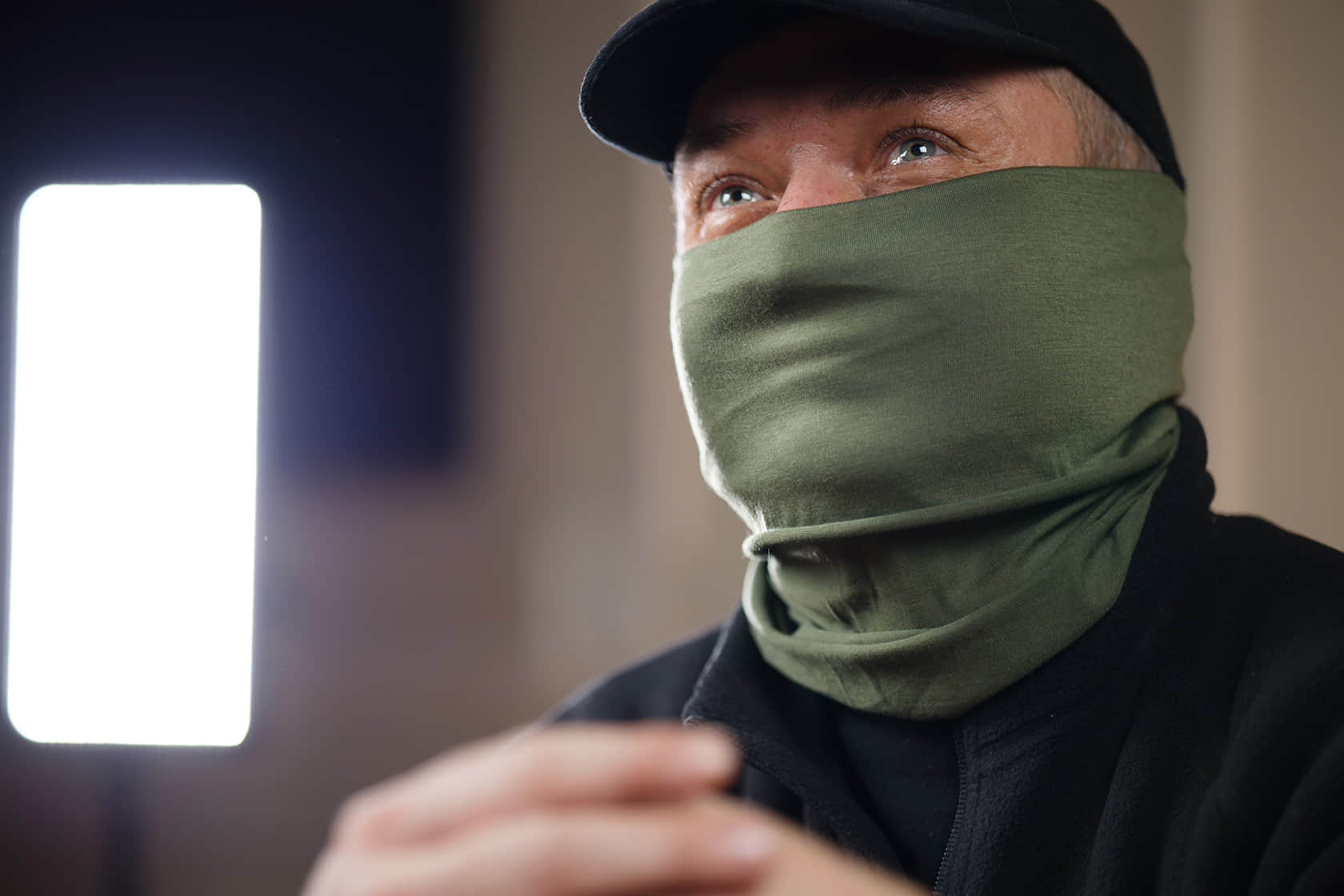 Narkoz: Truth is the best natural painkiller.
Narkoz: Truth is the best natural painkiller.
Once we are more aware of what is happening, it will be easier to cope with the painALL PHOTOS: DMYTRO LARIN
In the name of Hippocrates
A line from The Ballad of the Struggle, recited in a hoarse voice, rings out from Narkoz's smartphone as his custom ringtone plays [The Ballad of the Struggle is a poem written by Vladimir Vysotsky, a Soviet singer-songwriter, poet and actor whose profound and lasting impact significantly influenced Soviet culture - ed.]: "It means that you read the right books as a child!" What children's books are right for a future anaesthesiologist? "I used to get sick a lot as a child.
Needless to say, a doctor would visit every time, but my parents had a habit of double-checking all of the prescriptions he wrote. They weren't healthcare professionals themselves, but they had an old paramedic's reference guide - a thick 500-page tome dating back to 1952 or 1953 - on their bookshelf, just in case it was ever needed, and would consult it. When I was 11 or 12 I started reading it too," recalls Narkoz.
As he entered adulthood, his childhood propensity to fall ill subsided, but his interest in medicine only grew. The young man graduated from medical school in the early 2000s. Just like Hippocrates, he swore to uphold the ideals of mercy, love, harmony and mutual respect. "I swear by Apollo Healer, by Asclepius, by Hygieia, by Panacea, and by all the gods and goddesses, making them my witnesses, that I will carry out, according to my ability and judgement..."
Hippocrates would never have guessed back then that a graduate of a Ukrainian medical university would have to work two other jobs in addition to his internship to make ends meet, and not meet Apollo prematurely. If there was a TV show called Make an Anaesthesiologist Laugh (in the same vein as Make a Comedian Laugh, a popular Ukrainian game show where contestants win a cash prize if they succeed in amusing the judges within one minute), Narkoz would undoubtedly be an honorary chairman of the jury. At the very least, his stories about the relationship between surgeons and anaesthesiologists are much appreciated, and always leave the audience feeling thankful.
"Surgeons and anaesthesiologists are always like 'yin and yang'; sometimes in harmony, and sometimes opposed. We can't work without each other, but we're always pulling each other's legs. Being united by a common purpose inspires confidence in our patients."
To "Make an Anaesthesiologist Laugh" is not difficult (and at this point in the story, another one of Narkoz's jokes about surgeons and anaesthesiologists would practically be expected). To surprise him, on the other hand, is much more of a challenge, as he entered the Ukrainian medical field during the freewheeling days of the early 2000s. "When I started my career at the beginning of the 2000s, I met many 'Soviet-style' doctors who would drink [any intoxicating substance] they could get their hands on, and made these strange 'cocktails'..."
Fate spared Narkoz from following in their footsteps, as he would work in a country with strict anti-alcohol laws for the next three years.
Advertisement:Working in Libya
"One day, my classmate from university called me: 'They're offering contracts for doctors to go and work in Libya. I like the idea, and think we should sign up together.' I tried to change his mind: 'Seriously, Libya?
It's always a police state, or ruled by a dictator, or at war, or experiencing a rebellion.' Nevertheless, the call piqued my interest, and I took a closer look at the job opportunity. A few months later, I called my friend informing him that I'd almost finalised my application, and that we just needed to submit some documents and sign a contract. In response, I heard 'You know, on second thought I've decided I don't want to go there.'
And that's how I ended up in Libya. Our district hospital in the south of the country was the closest one to the border with Chad, at a time when there were constant border clashes. It was there that I first became acquainted with combat medicine, and gained my first experience with traumatic injuries and gunshot wounds.
The hospital treated all kinds of patients - civilians, soldiers and police - and employed Libyan, Palestinian, Jordanian, Bulgarian, Polish and Ukrainian doctors. There were gentlemen in their 50s who had been educated in Germany and Italy, and here I was, a mere 24-year-old. I was struck by the Libyans' attitude towards doctors.
They may have perceived you as a "heathen" for not being Muslim, but the fact that you were a doctor more than made up for that "sin". I've never seen such respect for doctors anywhere in Ukraine. Many of the things I saw in Libya seemed preposterous to me at first.
The list of medicines used in the hospital was an immediate surprise - it was three times shorter than the equivalent list in Ukraine. 'I have too few [medicines] at my disposal', I feared. However, it turns out that you can and should effectively treat patients without snake oil. Putting a person on a dozen drugs instead of three won't make them feel better.
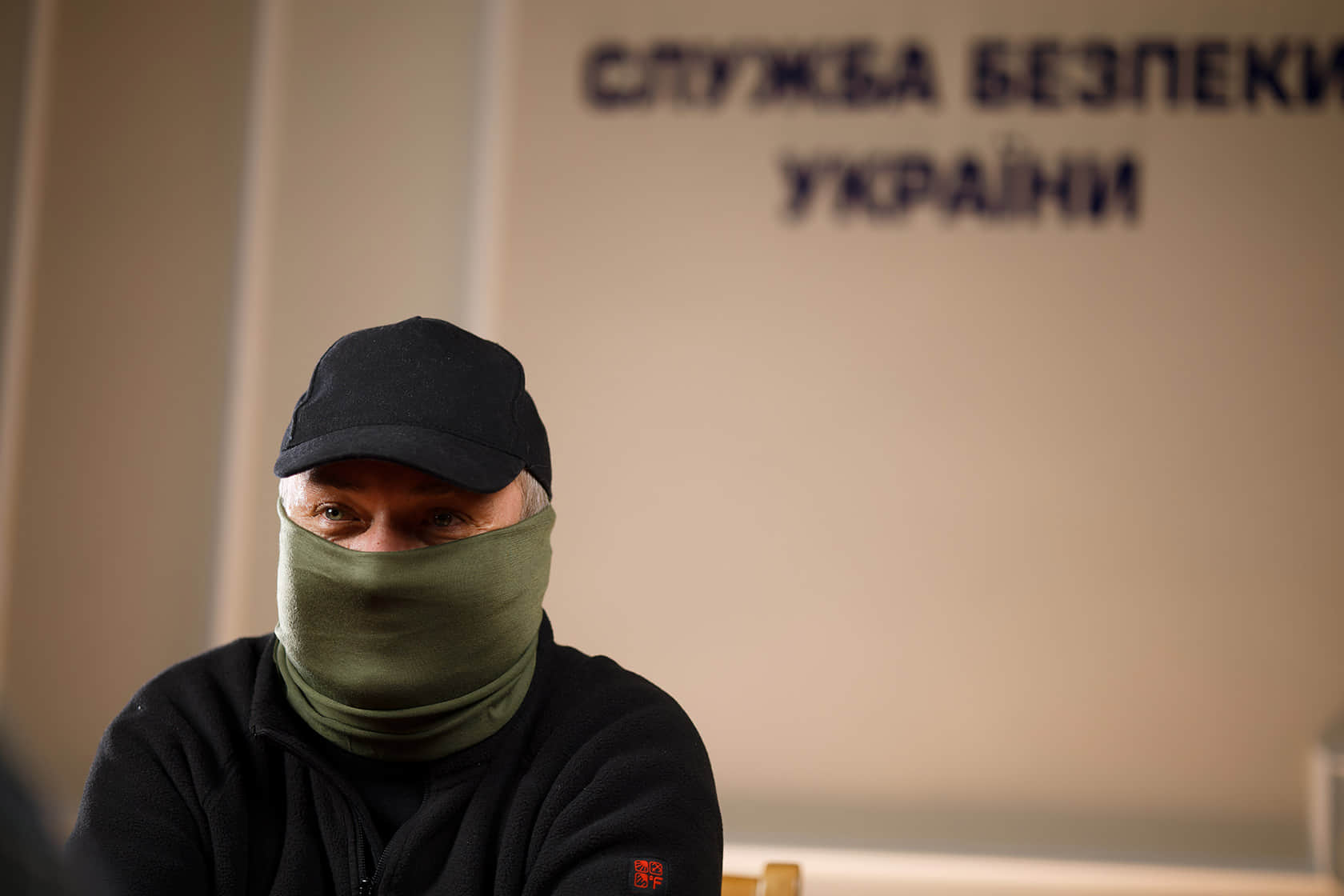 Narkoz: "Ukrainian medicine approached the protocol level that was in Libya in the early 2000s only 3-5 years ago"
Narkoz: "Ukrainian medicine approached the protocol level that was in Libya in the early 2000s only 3-5 years ago"
In Libya, I first performed a procedure whose description would not appear in the medical corpus until ten years later - the ultrasound-guided treatment of a pericardial puncture (hole in the outer lining of the heart).
The story was as follows: A five-year-old boy was admitted with a gunshot wound, having come under 'friendly fire'. An X-ray revealed that three small pellets had hit his chest, in a manner which wouldn't usually cause life-threatening injury. Yet this child was dying before our eyes.
A computed tomography scan showed that whilst two pellets had lodged in the skin, the third one went through an intercostal space (gap between two ribs) and pierced the right ventricle of the heart. In such cases, lots of blood pools in the pericardium, interfering with the heart's ability to contract. As we were preparing the operating theatre, my colleague performed an ultrasound of the child's heart.
He called out 'It's about to stop'. Going through the setup process had cost us time we didn't have. We had to act fast.
I grabbed a regular metal intravenous cannula and said to the doctor, who was observing my needle and the child's heart on the ultrasound machine: 'I'm aiming for the pericardial cavity; help me guide the needle there.' I successfully reached the pericardial sac, drained four syringefuls of accumulated blood, and the heart began contracting again. Nowadays, similar gunshot wounds are seen quite commonly in casualties of the Ukraine war."
Advertisement:Called up twice
When Narkoz returned from Libya in 2005, he could not have imagined that his three years of experience dealing with combat-related injuries would come in handy back home in Ukraine. For many, the war broke out on 24 February 2022, the day Russia escalated the conflict by launching a full-scale invasion of Ukraine.
Narkoz's war began in March 2014, when he arrived at the military enlistment office seeking to volunteer. As bureaucratic red tape was slowing down official mobilisation efforts, Narkoz trained volunteers who were turning civilian cars into makeshift ambulances to evacuate wounded troops from the battlefield. He taught them how to properly carry and secure stretchers in the cars, where to place medical equipment, and how to protect oxygen cylinders.
Doctors with experience like Narkoz's were worth their weight in gold in Ukraine. That's how he ended up in the medical service of the Ukrainian Armed Forces - not in a hospital somewhere in the rear, but right on the front lines. When Ukraine received the first mobile emergency medical unit from its Western partners, he was in charge of it for almost a year.
The expected deployment time for that mobile module - 24 hours - is something Narkoz recalls with surprise today: it would be considered too slow for the current war. After being discharged in 2016, Narkoz was retained in the first-line operational reserve and resumed working in civilian clinics. On the morning of 24 February 2022, having heard of the invasion and expecting to be called back up shortly, he reached out to his unit commander in advance. "There has been a reorganisation," replied the commander. "Neither your unit nor your position exist anymore.
Report to the military enlistment office." Upon doing so, he was told that there was "nothing for [his] rank or qualifications". A few days later, the doctor was standing guard at one of the territorial defence forces' checkpoints in Kyiv Oblast.
There was only one soldier among the defenders who had served in combat and could lead it all. The rest were hunters, former police officers and other concerned citizens. The fortifications and security measures could easily be breached by any half-decent Russian sabotage and reconnaissance group.
"I was on duty in this trench in the middle of a field, with wet snow falling on my head. Suddenly, a friend from the medical service called me and asked where I was. I told him I was at a checkpoint in a field.
He made an offer: 'How about joining us as a doctor?' Obviously, I preferred that line of work. 'When and where do you need me to be?' That's how, in March 2022, I joined the military medical service of the SSU Special Operations Centre A, and within a few days, I was deployed to the Irpin front."
Civilian and military doctors
"When a civilian physician becomes a military doctor, the first thing they have to do is change their mindset. After all, working in combat situations is significantly different from the usual medical practice.
The concept of a 'golden hour', within which the wounded on the battlefield should receive medical care, is highly relative. As the English-language literature says, 'death is ignorant of a golden hour'. For wounds that cause internal bleeding, when blood enters the chest or abdominal cavity, it's a race against the clock.
Unless you win this time, there will never be a 'later' for the wounded soldier. Military surgeons 'in the field' therefore often have to neglect procedures they are accustomed to in civilian hospitals.
Advertisement:Like the usual routine of treating the stomach with iodine three times, donning disposable scrubs and tying them properly at the back, getting the nurse to do this or that, checking if we have a complete set of tools at hand, doing a cardiogram again, and measuring the patient's blood sugar level... Whatever the level is, the wounded person will bleed to death.
Here's another thing: in civilian life, when a person comes to see a surgeon about an issue, the surgeon takes the person to an operating room to address the issue. One issue equals one operating room admission. For example, the person's stomach is cut open, then stitched closed - and that's it, their issue is solved.
That's not how things work at the front. Combat wound surgery is first and foremost about stopping the patient from dying. Not comprehensively addressing a particular issue, but doing everything to prevent the wounded soldier from dying there and then.
We stop the internal bleeding, put a bandage on their stomach, and hand them over to those in charge of the next stage of treatment. That's what saves their life. After a day or two in intensive care their condition will become more stable, and they can be operated on again - this time in a proper surgical manner, like we're used to in civilian life.
A painstaking four- or five-hour operation where you try to perfectly place every stitch on a patient with hypothermia who has lost a lot of blood is more likely to kill them than save their life. That's a classic case of the road to hell being paved with good intentions. The third thing is that we always go around inspecting stabilisation points (a military term for first-aid centres close to the front lines) in the area, whenever our resuscitation and surgical brigades are deployed to a new location.
One of the first things we ask is whether the medical staff at those stabilisation points carry out blood transfusions. In 9 out of 10 cases they don't. We ask why - and hear dozens of reasons in response.
My favourite: 'I don't believe in red blood cells.' That line was spoken by a doctor. Go to any public hospital - especially one that doesn't specialise in surgery or trauma. I don't think it would be too much of an exaggeration to say that a lot of doctors in Ukraine have never carried out a blood transfusion.
This isn't a problem specific to combat medicine, but one with the Ukrainian medical system as a whole. The army is a subset of society at large, including its medical system; this general issue has carried over into the army and become more critical there."
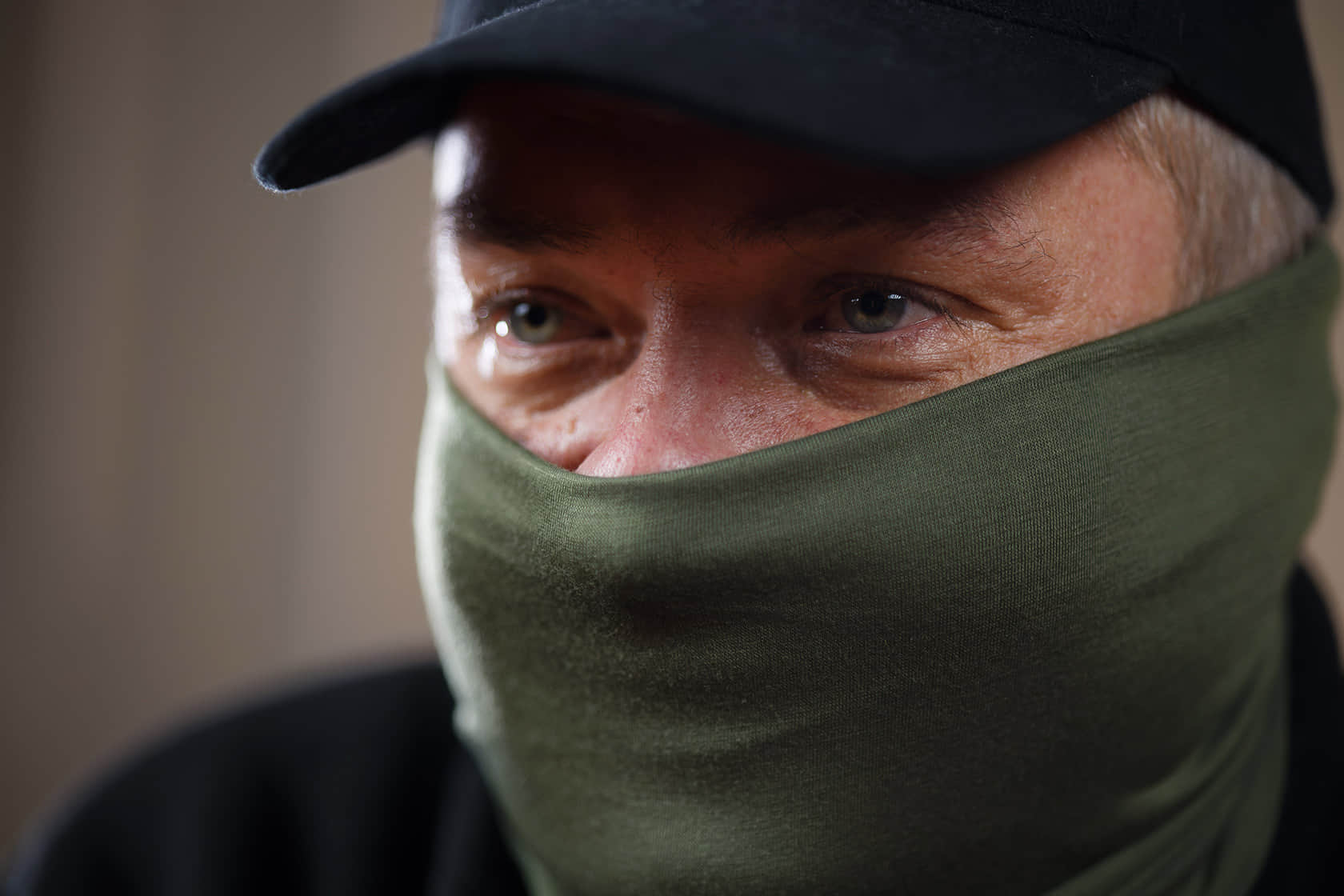 Narkoz: "We have to choose the most motivated medical staff, not just doctors, and train them according to NATO standards."
Narkoz: "We have to choose the most motivated medical staff, not just doctors, and train them according to NATO standards."
Practising on shadows and makeshift operating theatres
An operating theatre can be any four - or sometimes three - walls capable of protecting doctors from the elements. You have a head-torch for illumination, and a gurney for an operating table.
Occasionally you'll see a group of people performing a strange ritual: operating on a nonexistent patient. This isn't some avant-garde film about the elusive nature of the material world, but a routine occurrence for mobile surgical groups from Special Operations Centre A: it's called "practising on shadows". "If a person who had no idea what was going on saw us practise, they would probably be very surprised.
Doctors go through the motions of surgery and discuss things like whether the two chairs in the operating room should be brought closer, so that the bag of surgical instruments is easier to reach. If you have to step away to reach it, you're losing one or two seconds each time you need to grab a tool. Take ten steps and you've lost half a minute, an amount of time that can be critical for an injured soldier."
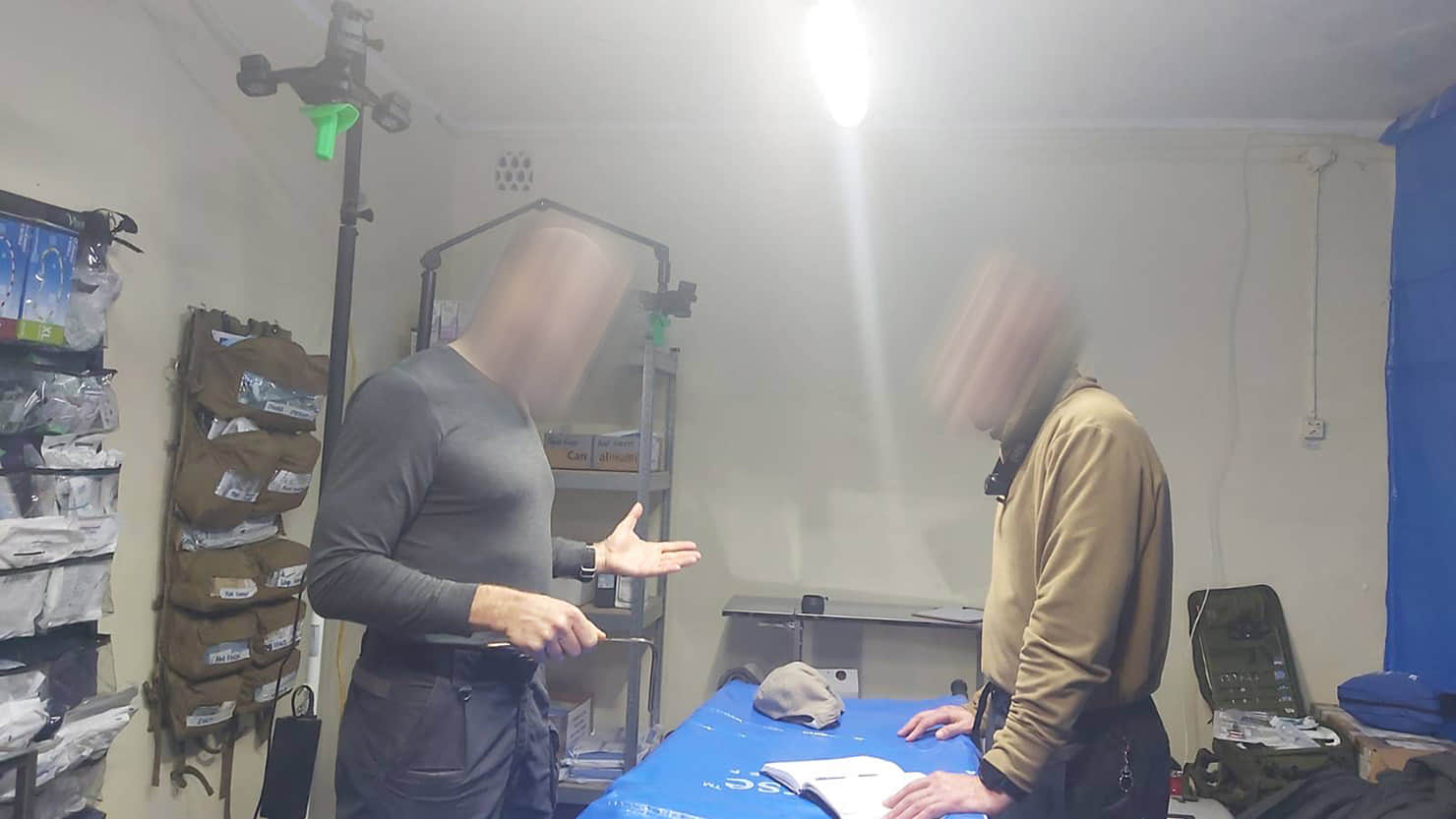 Narkoz: "We practise the sequencing and coordination of movements until they become automatic.
Narkoz: "We practise the sequencing and coordination of movements until they become automatic.
Everyone knows what they're supposed to be doing at any given moment, they know why they're doing it, and can help the others if needed."Photo: Ukraine's Security Service Special Operations Centre A
The main purpose of resuscitation and surgical brigades' work is to bring specialised medical assistance as close to injured soldiers as possible. The closest location to the front line where Narkoz has had to operate - on someone's heart, no less - was only around seven kilometres from ground zero. A half-destroyed abandoned building, a basement, or in the worst case scenario, a van can be turned into an operating theatre in 30 minutes at the most.
If plaster, paint, dirt and shards of old wood are flaking off the walls - in some cases, they can only be charitably described as "walls" - the entire interior is lined with special protective sheets. Each mobile group consists of a surgeon, anaesthesiologist and emergency doctor. Each of them has a backpack with all of the tools and equipment they need plus stocks of blood for transfusions.
After helping each patient, the doctors discuss what went wrong and how they could improve for next time. Video: Ukraine's Security Service Special Operations Centre A
A typical frontline deployment lasts for between five days and two months. In his two years as part of a resuscitation and surgical brigade, Narkoz has worked on the Zhytomyr, Kharkiv, Kherson and Zaporizhzhia fronts, in Bakhmut, and on Zmiinyi (Snake) Island. Narkoz witnessed Russian forces consciously and deliberately targeting medical facilities, which are supposed to be off-limits under internationally-recognised rules of war, along the entire front line on many occasions.
Once, a Russian missile struck an area where doctors had been working only minutes before. "A colleague and I were thirsty, so we went to our car, and the area [where we just were] got hit by two S-300 missiles," he recalls. Narkoz's tone is what's most striking in his stories, with the horrors he witnesses daily becoming routine, and seen as the norm.
He details how one of his colleagues extracted an unexploded grenade from a soldier's body. The surgeon worked alone so as not to risk anyone else's life. Still, there is room for humour even in situations like this.
The medics consulted an explosives specialist before the grenade extraction procedure to find out whether the grenade might explode in the surgeon's hands. "How can we find out?" the medics asked the specialist. "Extract it and you'll find out," he responded, without a trace of irony.
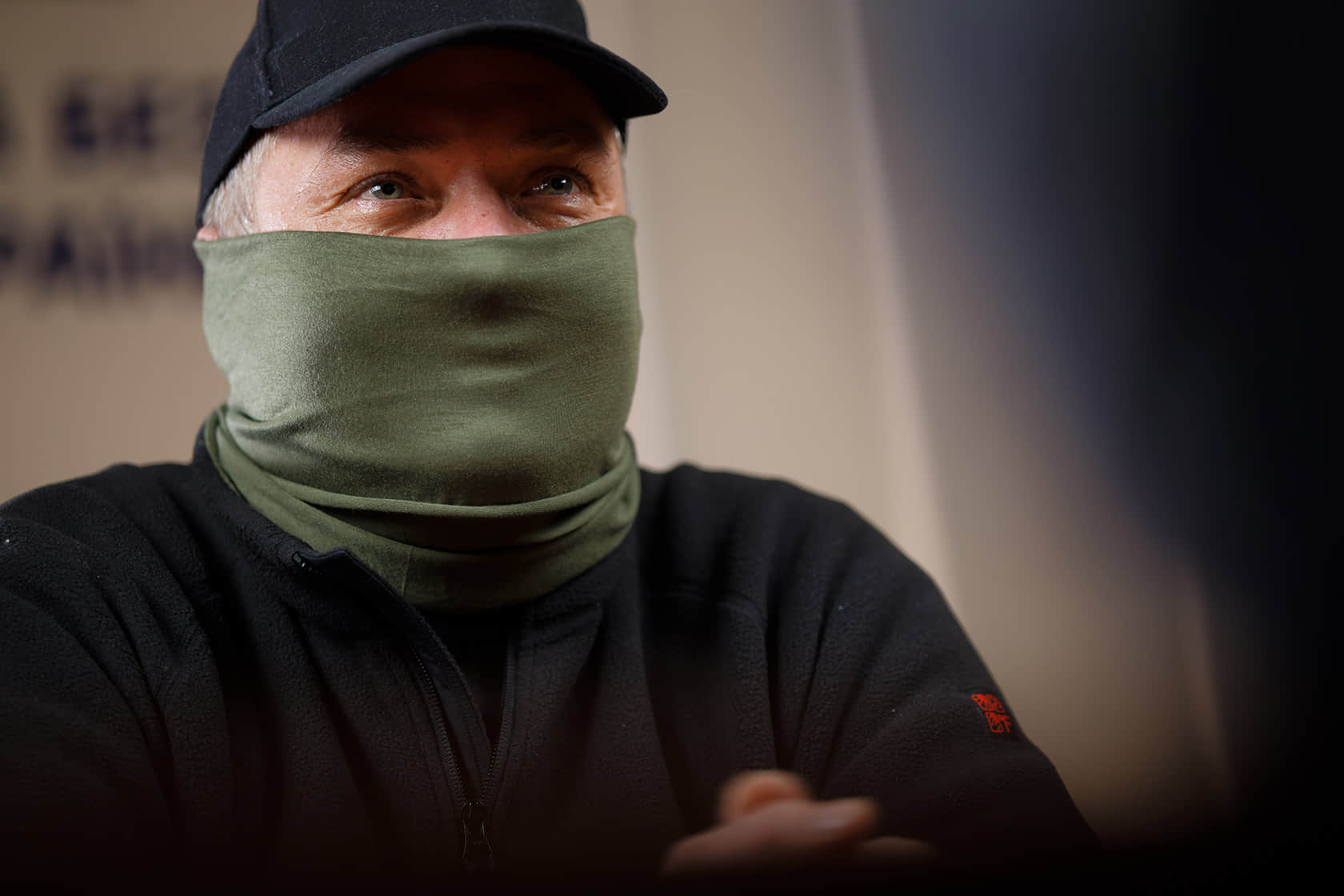 Narkoz: "After a frontline deployment, I need two to three days to decompress. If possible, completely out of anyone's reach and offline."
Narkoz: "After a frontline deployment, I need two to three days to decompress. If possible, completely out of anyone's reach and offline."
Another one of Narkoz's stories from the Bakhmut front illustrates the combat medics' daily efforts to outpace death. "A soldier was brought in after a Grad [multiple-launch rocket system] attack.
He had been injured almost two days prior, but there was no way to transport him to us sooner. Shrapnel had penetrated his left lung, diaphragm, and stomach, and pierced his colon. He was conscious.
He had no life-threatening bleeding - he wouldn't have survived that long if he did. We knew we had to operate immediately: 'My friend, we're taking you to the operating theatre. We'll see how things go from there...'
Every now and again the surgeon asked: 'Is he alive?' 'Yes, but I can't guarantee anything,' I replied. We just kept working. The operation drew to an end: he was a serious case, but he would live a while longer.
We were searching for a way to transport him onwards: in a state like his he couldn't just be moved in a regular evacuation vehicle. He needed a proper support team tending to him to make it out alive. Then another injured person was brought in - that was the day of the attack on Kostiantynivka.
We were working on this second person, glancing at the first one every now and then. He was on a ventilator, but remained conscious and had sufficient blood pressure. Then someone said 'Look, he's taking his tube out.' We turned to face him, and he sat up and said 'My stomach hurts a bit, but otherwise I'm fine.'
Eventually, we found an ambulance and sent him to Dnipro. Just a few hours earlier we weren't even sure if he'd survive the operation, let alone be fully conscious, breathing independently and ready to head back to Dnipro."
Advertisement:On maturing as a doctor and enjoying his work
"I have much more professional confidence now than I did when I started working as a physician after graduating from university. At the same time, I'm a lot less cocky.
I reflect a lot more on whether I'd done everything right, or whether there was another solution. I'd say that this is more than just a job - it's a way of life. Our lives are shaped by our work; you can't be a combat medic from 9 to 5, with a daily lunch break.
I was very hot-headed and used to lose my temper very easily. I used to think I didn't need any advice because I'd already learned everything I needed to know at university. With experience, you realise that nothing you studied at university applies to real life.
I'm a lot calmer and more level-headed now. I count to 10 before saying anything - and oftentimes I no longer want to say the same things by the time I reach 10. Unfortunately, I also trust people less.
But I do trust my gut more. Intuition is a subconscious expression of our learned experience. When I think something is off about someone upon first meeting them, I usually turn out to be right, even if that person has done a lot of good.
This might sound cynical, but sometimes you get stew instead of a patient; there's no other way to describe it. And you just can't fathom how that person will make it to the end of the operation. But somehow, they pull through.
My main guiding principle, for many years, has been that someone lives until they die, and you have to do everything you can while they're alive. In my 23 years of experience, there have been many times when everyone thought that a patient would die; that everything was over for them. But Lazarus syndrome - named after the Biblical character and well-documented in medical literature - is undeniably real.
Many moons ago I was on duty in a municipal hospital. A man was brought in by ambulance. He had a bronchial asthma attack that had caused his blood circulation and breathing to halt.
The emergency team was performing CPR. I got on the case because there were no signs of biological death. After 40 minutes everyone said we should stop.
But I said: 'We all still have energy; let's continue for another five minutes and then we'll see.' After another couple of minutes of resuscitation, his heart started beating again. He was a difficult case, in a coma and on a ventilator.
I got him to the intensive care unit, all the while thinking 'Alright, we've got his heart beating, so maybe he'll live - I've treated patients like him before.' But what about his brain? We had no way to tell; there was no way to assess brain-death yet. He might become a huge burden for his family.
Did we do the right thing resuscitating him? I thought it must have been the right thing. Two or three weeks later I had friends over in my apartment for my birthday.
The doorbell rang, I opened the door, and there was that same patient, holding a TV in his arms. He said: 'Thank you; my son told me everything.' There's no need for any pompous statements about 'saving another life', but the thrill of cases like that one is what keeps me in this line of work.
They cause explosions of endorphins you can't experience any other way." *** How do you cure a society writhing in pain from gunshot wounds and internal bleeding?
How do you save it from the scorched earth, and the black abyss that has engulfed several generations? From the overwhelming guilt - the guilt of those who were unscathed whilst those around them suffered injuries, and of those who were only injured when others were killed. From the reality of the most common question soldiers ask before being administered anaesthesia, according to Narkoz: "Can my limb be saved?", and the most common question asked when they regain consciousness: "Will I be able to return to combat shortly?"
Someone ought to know what to do with all this pain. Why not an anaesthesiologist? After all, "anaesthesia" comes from the Greek "an" - a negation, "aesthesia" - feeling, and "logos" - science, and so an anaesthesiologist is someone who takes away a patient's feeling - and thus pain.
My last question for Narkoz is about what can cure our society's pain. "You can cure the public's pain by promising a quick victory, and people will be hooked. But as soon as this drug runs out, the withdrawal symptoms will be horrible.
I wouldn't recommend waiting on a 'magic pill'. I would advise focusing on addressing the things that are causing the pain: in our case it means becoming stronger and strengthening our army. We should also focus less on our emotional response to pain, and more... on our actions."
We live until we die, and we have to do everything we can while we're alive. Mykhailo Kryhel, Ukrainska Pravda Translation: Artem Yakymyshyn and Olya Loza
Editing: Ben McBride